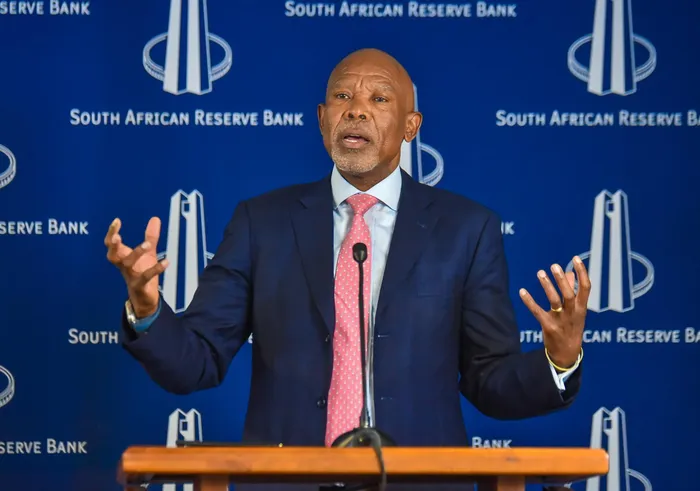
SARB Governor, Lesetja Kganyago, said the Monetary Policy Committee has cut the policy rate by 25 basis points, effective 30 May.
Image: SARB/Facebook
South African Reserve Bank (SARB) Governor, Lesetja Kganyago, on Thursday said that dropping the inflation target to 3% would result in South Africa being a low-inflation, low-interest rate country, which would bring with it economic growth.
Addressing the media after announcing an expected 0.25 percentage point cut in the lending rate, dropping prime to 10.75%, Kganyago explained that the lower inflation target would also assist with price-controlled costs such as electricity and fuel. The cut mirrors those made in the UK, Europe, and New Zealand and is South Africa’s fourth since last September.
“For some years now, internal and external analysis has shown that our inflation target is too high and too wide,” he said of the current 3% to 6% target range. Inflation was 2.8% in April, up from 2.7% in March.
Old Mutual chief economist, Johann Els, said he anticipated a lower inflation target to be announced towards the end of the year, which could reduce the objective to keeping increases in the cost of living at around 3%.
The Governor said that the central bank has been engaging with National Treasury on dropping the target and “technical work is at an advanced stage”. Kganyago added that the Reserve Bank’s “main contribution is to deliver price stability, and we see scope to lock in low inflation and clear the way for sustainably lower interest rates”.
Els explained that a lower inflation target would, over time, mean a more stable currency exchange rate and the repo interest rate could drop to 6% in the next two years from the current 7.5% instead of to just 7% based on the current target range. This, he explained, depended on inflation of 3%.
“It leaves room for two more rate cuts of 25 basis points each in July and September, given the substantial reduction in the Reserve Bank's forecast,” said Els. Regional Director and CEO of RE/MAX of Southern Africa, Adrian Goslett, said “any easing in the interest rate environment is a meaningful win for consumers”.
Els noted that the Bank had dropped its inflation rate forecast substantially, which was now 3.2% for this year from the March prediction of 3.6%. Bradd Bendall, national head of sales at BetterBond, said “inflation has been trending downwards since last year and is well within the Reserve Bank’s target range”.
SARB has revised its gross domestic product (GDP) expectation lower to just 1.2% from 1.7% this year, lower than Finance Minister Enoch Godongwana’s anticipated 1.4%, which he made earlier this month during the third iteration of the National Budget.
Kganyago noted that there had been disappointing growth figures from sectors such as mining and manufacturing, although first quarter economic growth figures were still awaited. GDP growth was just 0.6% last year.
FNB Chief Economist Mamello Matikinca-Ngwenya said the “MPC’s decision to cut interest rates highlights a greater focus on domestic fundamentals.
"Inflation remains below the bottom of the inflation target range and high-frequency data reflects a weak start to 2025 from a productive sector point of view, which will be worsened by faltering global prospects. Ultimately, the macroeconomic outlook is benign, providing ample space for a continued cutting cycle.”
Related Topics:
